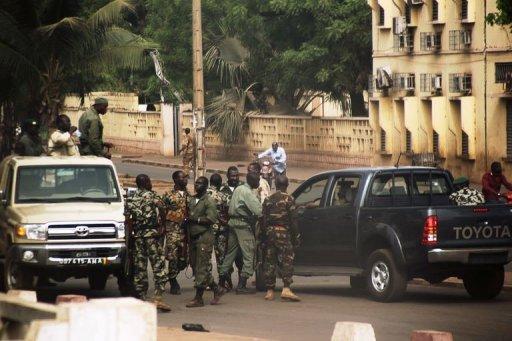Mali’s Tuareg rebels claimed control of the legendary desert town of Timbuktu on Sunday, part of a dramatic push across the north, as the disorganized junta indicated it was ready to cede some power.
Tuareg rebels assisted by Islamist fighters have swept across much of northern Mali since renegade soldiers staged a coup on March 22, saying they were fed up with the government’s handling of a Tuareg fight for an independent homeland.
But since the coup, the rebels have seized several towns, including Kidal and then Gao, the regional capital that had served as the army headquarters for the entire northern region.
Timbuktu — a fabled trading hub synonymous with exotic isolation — was the last major town in Mali’s north not to have fallen into rebel hands.
Announcing the “end of Malian occupation”, the MNLA (Azawad National Liberation Movement) said in a statement it would ensure “order and administration”.
On Sunday, witnesses told AFP they heard heavy weaponry blasting Timbuktu’s military base.
“Yes, the rebels have arrived in Timbuktu”, a resident told AFP by telephone. “As we speak, I see them going towards a bank in the city.”
A young civilian died after he was struck by shrapnel, said Omar Haidara, director of a Timbuktu private school.
The town of about 50,000 residents is a United Nations world heritage site, nicknamed the “pearl of the desert”.
“The treasury, the banks, police stations, the office of the governorate and even the hospital have been pillaged,” said the head of the local branch of a bank.
Mali’s political situation is growing increasingly chaotic after the internationally condemned coup which led President Amadou Toumani Toure to flee. He is in hiding in the capital Bamako but has said he is safe.
On Sunday, the coup leader Captain Amadou Sanogo, declared Mali’s constitution “restored” and announced the reinstatement of state institutions, promising elections in which the junta would not take part.
But the junta “is not going anywhere”, Sanogo asserted in English while speaking to AFP and the American National Public Radio (NPR) at military base in Kati, outside Bamako.
He explained that the new government would be led by a civilian prime minister, but the junta may select a defence or interior minister from within the military ranks.
“We’ll be watching closely, but the government will be in full charge of doing (a) lot of stuff,” he said.
Sanogo gave no timeline for the creation of the new government.
The Economic Community of West African States (ECOWAS), which fiercely condemned the coup, has threatened tough sanctions if constitutional order is not restored by Monday.
Late Sunday, Ivory Coast’s President Alassane Ouattara said the bloc would hold another summit on the Mali crisis in Senegal’s capital Dakar on Monday.
Sanogo said his priority was saving Mali from “chaos”.
He told AFP the junta had sent envoys to the rebels to discuss a ceasefire.
“We have inherited … a desperate situation, we’re trying to make the best of it. We’ve already dispatched emissaries on the ground to try to obtain a ceasefire,” he said.
He vowed to do everything possible “to make this better”.
“It’s my promise,” he said.
A former government minister, Mohamed Ag Erlaf, called an AFP journalist to say that he was the only envoy sent by the junta. He said he arrived in Timbuktu and that he met with a senior MNLA commander, Mohamed Najim.
“It’s calm in Timbuktu,” Ag Erlaf said, adding that the rebel leader made assurances on the population’s safety and “said he was in favour of a solution”.
The MNLA has relaunched a decades-old fight for the independence of what the Tuareg consider their homeland in the vast desert region.
It has been joined by the Islamist Ansar Dine (Defenders of Faith, in Arabic) which is headed by renowned Tuareg rebel Iyad Ag Ghaly and has ties to Al-Qaeda’s north Africa branch, known as Al-Qaeda in the Islamic Maghreb.
Another Qaeda-related group, the Movement for Unity and Jihad in West Africa (Mujao), has said it too took part in the fight for Gao.
The MNLA’s capabilities were boosted when fighters brought weapons into Mali from neighbouring Libya after the fall of Moamer Kadhafi.
Following the coup, the European Union, the United States and other Western powers suspended hundreds of millions of dollars (euros) of support for landlocked Mali — except for emergency aid to drought-hit regions.
Washington, which has warned the region was becoming a new hub for Al-Qaeda, on Friday supported regional African bloc ECOWAS’s efforts to force the junta to step down.
The Tuareg offensive has caused more than 200,000 people to flee their homes in the remote region that is also a hub for arms and drug trafficking.










